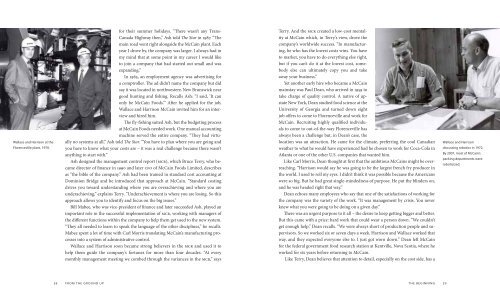From the Ground Up - McCain Foods Limited
From the Ground Up - McCain Foods Limited
From the Ground Up - McCain Foods Limited
Create successful ePaper yourself
Turn your PDF publications into a flip-book with our unique Google optimized e-Paper software.
Wallace and Harrison at <strong>the</strong><br />
Florenceville plant, 1970.<br />
for <strong>the</strong>ir summer holidays. “There wasn’t any Trans-<br />
Canada Highway <strong>the</strong>n,” Ash told The Star in 1987. “The<br />
main road went right alongside <strong>the</strong> <strong>McCain</strong> plant. Each<br />
year I drove by, <strong>the</strong> company was larger. I always had in<br />
my mind that at some point in my career I would like<br />
to join a company that had started out small and was<br />
expanding.”<br />
In 1965, an employment agency was advertising for<br />
a comptroller. The ad didn’t name <strong>the</strong> company but did<br />
say it was located in northwestern New Brunswick near<br />
good hunting and fishing. Recalls Ash: “I said, ‘It can<br />
only be <strong>McCain</strong> <strong>Foods</strong>.’” After he applied for <strong>the</strong> job,<br />
Wallace and Harrison <strong>McCain</strong> invited him for an interview<br />
and hired him.<br />
The fly-fishing suited Ash, but <strong>the</strong> budgeting process<br />
at <strong>McCain</strong> <strong>Foods</strong> needed work. One manual accounting<br />
machine served <strong>the</strong> entire company. “They had virtually<br />
no systems at all,” Ash told The Star. “You have to plan where you are going and<br />
you have to know what your costs are – it was a real challenge because <strong>the</strong>re wasn’t<br />
anything to start with.”<br />
Ash designed <strong>the</strong> management control report (MCR), which Bruce Terry, who became<br />
director of finance in 1990 and later CFO of <strong>McCain</strong> <strong>Foods</strong> <strong>Limited</strong>, describes<br />
as “<strong>the</strong> bible of <strong>the</strong> company.” Ash had been trained in standard cost accounting at<br />
Dominion Bridge and he introduced that approach at <strong>McCain</strong>. “Standard costing<br />
drives you toward understanding where you are overachieving and where you are<br />
underachieving,” explains Terry. “Underachievement is where you are losing. So this<br />
approach allows you to identify and focus on <strong>the</strong> big issues.”<br />
Bill Mabee, who was vice-president of finance and later succeeded Ash, played an<br />
important role in <strong>the</strong> successful implementation of MCR, working with managers of<br />
<strong>the</strong> different functions within <strong>the</strong> company to help <strong>the</strong>m get used to <strong>the</strong> new system.<br />
“They all needed to learn to speak <strong>the</strong> language of <strong>the</strong> o<strong>the</strong>r disciplines,” he recalls.<br />
Mabee spent a lot of time with Carl Morris translating <strong>McCain</strong>’s manufacturing processes<br />
into a system of administrative control.<br />
Wallace and Harrison soon became strong believers in <strong>the</strong> MCR and used it to<br />
help <strong>the</strong>m guide <strong>the</strong> company’s fortunes for more than four decades. “At every<br />
monthly management meeting we combed through <strong>the</strong> variances in <strong>the</strong> MCR,” says<br />
Terry. And <strong>the</strong> MCR created a low-cost mentality<br />
at <strong>McCain</strong> which, in Terry’s view, drove <strong>the</strong><br />
company’s worldwide success. “In manufacturing,<br />
he who has <strong>the</strong> lowest costs wins. You have<br />
to market, you have to do everything else right,<br />
but if you can’t do it at <strong>the</strong> lowest cost, somebody<br />
else can ultimately copy you and take<br />
away your business.”<br />
Yet ano<strong>the</strong>r early hire who became a <strong>McCain</strong><br />
mainstay was Paul Dean, who arrived in 1959 to<br />
take charge of quality control. A native of upstate<br />
New York, Dean studied food science at <strong>the</strong><br />
University of Georgia and turned down eight<br />
job offers to come to Florenceville and work for<br />
<strong>McCain</strong>. Recruiting highly qualified individuals<br />
to come to out-of-<strong>the</strong>-way Florenceville has<br />
always been a challenge but, in Dean’s case, <strong>the</strong><br />
location was an attraction. He came for <strong>the</strong> climate, preferring <strong>the</strong> cool Canadian<br />
wea<strong>the</strong>r to what he would have experienced had he chosen to work for Coca-Cola in<br />
Atlanta or one of <strong>the</strong> o<strong>the</strong>r U.S. companies that wanted him.<br />
Like Carl Morris, Dean thought at first that <strong>the</strong> ambitious <strong>McCain</strong>s might be overreaching.<br />
“Harrison would say he was going to be <strong>the</strong> largest french fry producer in<br />
<strong>the</strong> world. I used to roll my eyes. I didn’t think it was possible because <strong>the</strong> Americans<br />
were so big. But he had great single-mindedness of purpose. He put <strong>the</strong> blinders on,<br />
and he was headed right that way.”<br />
Dean echoes many employees who say that one of <strong>the</strong> satisfactions of working for<br />
<strong>the</strong> company was <strong>the</strong> variety of <strong>the</strong> work. “It was management by crisis. You never<br />
knew what you were going to be doing on a given day.”<br />
There was an urgent purpose to it all – <strong>the</strong> desire to keep getting bigger and better.<br />
But this came with a price: hard work that could wear a person down. “We couldn’t<br />
get enough help,” Dean recalls. “We were always short of production people and supervisors.<br />
So we worked six or seven days a week. Harrison and Wallace worked that<br />
way, and <strong>the</strong>y expected everyone else to. I just got worn down.” Dean left <strong>McCain</strong><br />
for <strong>the</strong> federal government food research station at Kentville, Nova Scotia, where he<br />
worked for six years before returning to <strong>McCain</strong>.<br />
Like Terry, Dean believes that attention to detail, especially on <strong>the</strong> cost side, has a<br />
28 <strong>From</strong> <strong>the</strong> <strong>Ground</strong> up<br />
t he BeG inninG 29<br />
Wallace and Harrison<br />
discussing robotics in 1972.<br />
By 2007, most of <strong>McCain</strong>’s<br />
packing departments were<br />
roboticized.






